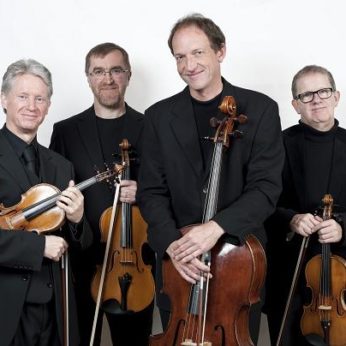Composer: Alexander Glazunov (b. 1865 - d. 1936)
Performance date: 05/07/2014
Venue: Bantry Library
Composition Year: 1891-2
Duration: 00:31:08
Recording Engineer: Damian Chennells, RTÉ lyric fm
Instrumentation: 2vn, 2va, 2vc
Instrumentation Category:String Quintet
Artists:
Vanbrugh Quartet (Gregory Ellis, Keith Pascoe [violins] Simon Aspell [viola] Christopher Marwood [cello]) -
[quartet]
Philip Higham -
[cello]

Glazunov
became famous in his teens when his First Symphony was performed to great
acclaim in March, 1882, conducted by Balakirev. Three years previously
Balakirev had recommended that the talented boy, who was gifted with an
exceptional ear and musical memory, should study composition privately with
Rimsky-Korsakov. The lessons only lasted for two years because Rimsky-Korsakov
discovered that Glazunov progressed not
from day to day but from hour to hour. A lifelong friendship developed
between the two and they were both members of the
as the group of Russian composers who met each Friday at the home of the wealthy
Mitrofan Belyayev was called. Belyayev devoted his immense fortune to furthering
the careers of Glazunov and the younger generation of Russian composers,
organising the Russian Symphony Concerts in
in 1885 and a music publishing business in
In
the early 1890s there was a considerable change in Glazunov’s style which can
be seen as a moving away from his adherence to the traditions of the Russian
musical classics by the composers known as The
Mighty Handful (Borodin, Cui, Musorgsky and Rimsky-Korsakov, led by
Balakirev) towards the style of Anton Rubinstein and Tchaikovsky. Briefly, The Mighty Handful wished to follow in
Glinka’s footsteps and create a distinctly Russian national school. By the
1880s this had been achieved and Rimsky-Korsakov then went his own way, allying
himself and his followers with Belyayev and affecting a rapprochement with the
West. Boris Schwarz neatly summed up Glazunov’s achievement: he succeeded in reconciling Russianism and
Europeanism. He was the direct heir of Balakirev’s nationalism but tended more
towards Borodin’s epic grandeur. At the same time he absorbed Rimsky-Korsakov’s
orchestral virtuosity, the lyricism of Tchaikovsky and the contrapuntal skill
of Taneyev.
He
wrote his String Quintet in 1891-2 and the changes in his style are evident in
this work. During these years before the end of the century Glazunov wrote most
of his string music to be played at the Friday evening socials at Belyayev’s
home and it was usually in the form of single movements collected into suites.
In the String Quintet he attempted to write a longer work showing evidence of
greater concentration and embracing a more cosmopolitan view.
The
first and third movements are particularly interesting for the way in which the
prevailing lyrical mood gradually becomes more dramatic. At the beginning of the
third movement the yearning solo cello melody is overwhelmed by dramatically
tense chords played by the other instruments, and the melancholy mood does not
brighten until near the end. The second movement begins pizzicato and is an
animated and brilliant virtuoso piece with a lyrical trio in the middle.
Glazunov wrote many scherzos, and this is one of the finest and wittiest of
them all. The exuberant dance-like Finale contains a number of contrasting
episodes in the manner of a rondo.
Copyright © 2024 West Cork Music. All rights reserved.
Designed and developed by Matrix Internet